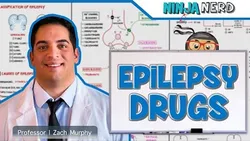
Drugs for Epilepsy 
Epilepsy is a neurological disorder that affects the brain's electrical activity. Treatment of epilepsy involves the use of antiepileptic drugs, which work by altering the brain's electrical activity. Common adverse effects of these drugs include drowsiness, dizziness, and confusion. Various drugs are available to treat epilepsy, and the best approach to treatment depends on the individual patient. ▼
ADVERTISEMENT
Course Feature
![]() Cost:
Cost:
Free
![]() Provider:
Provider:
Youtube
![]() Certificate:
Certificate:
Paid Certification
![]() Language:
Language:
English
![]() Start Date:
Start Date:
On-Demand
Course Overview
❗The content presented here is sourced directly from Youtube platform. For comprehensive course details, including enrollment information, simply click on the 'Go to class' link on our website.
Updated in [February 21st, 2023]
1. You will gain a comprehensive understanding of the pathophysiology of epilepsy and the mechanism of action for antiepileptic drugs. You will learn about the treatment approach to epilepsy and the adverse effects of antiepileptic drugs.
2. You will be able to apply your knowledge to practice questions and gain a better understanding of the drugs used to treat epilepsy. You will also be able to comment, like, and subscribe to the course to stay up to date with the latest information.
3. You will be able to gain a better understanding of the drugs used to treat epilepsy and the mechanism of action for antiepileptic drugs. You will also learn about the adverse effects of antiepileptic drugs and the treatment approach to epilepsy.
4. You will be able to gain a comprehensive understanding of the pathophysiology of epilepsy and the mechanism of action for antiepileptic drugs. You will also learn about the treatment approach to epilepsy and the adverse effects of antiepileptic drugs.
5. You will be able to apply your knowledge to practice questions and gain a better understanding of the drugs used to treat epilepsy. You will also be able to comment, like, and subscribe to the course to stay up to date with the latest information.
[Applications]
After completing this course, students should be able to apply the knowledge they have gained to their own practice. They should be able to identify the pathophysiology of epilepsy, understand the mechanism of action for antiepileptic drugs, and develop a treatment approach to epilepsy. Additionally, they should be able to recognize the adverse effects of antiepileptic drugs and be able to answer practice questions related to drugs for epilepsy.
[Career Paths]
1. Clinical Research Associate: Clinical Research Associates (CRAs) are responsible for the planning, coordination, and execution of clinical trials. They work closely with pharmaceutical companies, medical device manufacturers, and other organizations to ensure that clinical trials are conducted in accordance with applicable regulations and standards. CRAs are also responsible for monitoring the progress of clinical trials, collecting and analyzing data, and reporting results. The demand for CRAs is expected to grow as the pharmaceutical industry continues to expand.
2. Clinical Pharmacist: Clinical pharmacists specialize in the use of medications to treat and prevent disease. They work closely with physicians and other healthcare professionals to ensure that patients receive the most appropriate medications and dosages. Clinical pharmacists also provide patient education and counseling on the safe and effective use of medications. The demand for clinical pharmacists is expected to increase as the healthcare industry continues to grow.
3. Pharmaceutical Scientist: Pharmaceutical scientists are responsible for the development and testing of new drugs and medications. They work closely with pharmaceutical companies to develop new drugs and medications, as well as to test existing drugs and medications for safety and efficacy. Pharmaceutical scientists must have a strong understanding of chemistry, biology, and pharmacology in order to be successful in this field. The demand for pharmaceutical scientists is expected to increase as the pharmaceutical industry continues to grow.
4. Regulatory Affairs Specialist: Regulatory affairs specialists are responsible for ensuring that pharmaceutical companies comply with all applicable laws and regulations. They work closely with pharmaceutical companies to ensure that all products are safe and effective, and that all marketing materials are accurate and compliant with applicable regulations. The demand for regulatory affairs specialists is expected to increase as the pharmaceutical industry continues to expand.
[Education Paths]
1. Pharmacy Degree: A Pharmacy Degree is a great way to learn about the various drugs used to treat epilepsy. This degree will provide students with a comprehensive understanding of the pharmacology, pharmacokinetics, and pharmacodynamics of antiepileptic drugs. Additionally, students will gain an understanding of the clinical implications of these drugs, as well as the potential adverse effects. This degree is becoming increasingly popular as the demand for pharmacists with specialized knowledge in epilepsy increases.
2. Neuroscience Degree: A Neuroscience Degree is a great way to gain an understanding of the underlying mechanisms of epilepsy. This degree will provide students with a comprehensive understanding of the brain and its functions, as well as the various neurological disorders that can lead to epilepsy. Additionally, students will gain an understanding of the various treatments available for epilepsy, as well as the potential adverse effects. This degree is becoming increasingly popular as the demand for neurologists with specialized knowledge in epilepsy increases.
3. Clinical Psychology Degree: A Clinical Psychology Degree is a great way to gain an understanding of the psychological aspects of epilepsy. This degree will provide students with a comprehensive understanding of the psychological and behavioral aspects of epilepsy, as well as the various treatments available. Additionally, students will gain an understanding of the potential adverse effects of these treatments. This degree is becoming increasingly popular as the demand for psychologists with specialized knowledge in epilepsy increases.
4. Nursing Degree: A Nursing Degree is a great way to gain an understanding of the clinical aspects of epilepsy. This degree will provide students with a comprehensive understanding of the clinical management of epilepsy, as well as the various treatments available. Additionally, students will gain an understanding of the potential adverse effects of these treatments. This degree is becoming increasingly popular as the demand for nurses with specialized knowledge in epilepsy increases.
Course Provider

Provider Youtube's Stats at AZClass
Discussion and Reviews
0.0 (Based on 0 reviews)
Explore Similar Online Courses
![Docker Tutorial for Beginners Docker Full Course Access to FREE LABS [No Ads]](/ccsimg/td_book/check/4d03869ea4e0c4de1e3cf8e9beaf8d6e.webp)
Docker Tutorial for Beginners Docker Full Course Access to FREE LABS [No Ads]

Alteryx Tutorial for Beginners - 2+ Hours of Alteryx Training & Alteryx Demo

Python for Informatics: Exploring Information

Social Network Analysis

Introduction to Systematic Review and Meta-Analysis

The Analytics Edge

DCO042 - Python For Informatics

Causal Diagrams: Draw Your Assumptions Before Your Conclusions

Whole genome sequencing of bacterial genomes - tools and applications

Birth of a drug

Pharmacology


Start your review of Drugs for Epilepsy